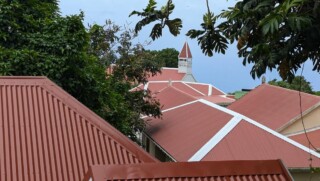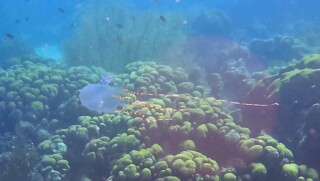Greenpeace foresees serious impact of Climate Change on Bonaire
KRALENDIJK- The Greenpeace organization foresees serious impacts on Bonaire of Climate Change. This is, with more detail, written out in a special Greenpeace report on Bonaire ‘Futuro di Boneiru’.
“Just like the other Caribbean islands in the Dutch kingdom, Bonaire is one of the islands which we
should be increasingly worried about. Bonaire is a low-lying island, this means sea level rise can have an enormous impact”, according to the organization.
The report notes that Bonaire has a unique coral fringe, circling the island. “The importance of the coral reef for Bonaire is often emphasized, with regard to its local biodiversity, cultural identity and its economy. But if we discuss the future of Bonaire, we should underline that the coral also acts as a protective buffer against increasingly higher storm waves due to rising sea level”.
The nature organization notes that coral is a living breakwater, and of utmost importance in protecting Bonaire, but it is exactly climate change which is a big threat to coral reefs around the world.
Faster
Greenpeace also notes that a study by the KNMI found in May 2022 that the sea level will rise quicker around Bonaire and neighbouring islands, than on average in the rest of the world. “This will lead to more frequent extreme water levels, for example if a storm passes by. Inhabitants could then experience flooding, saltwater intrusion and coastal erosion further inland. As a result, some parts of the islands will become uninhabitable. Beaches will also disappear under water, which has a big impact on tourism too.
Greenpeace quotes the KNMI in stating that ‘The next generation of islanders will end up in a completely different landscape’.
Extreme weather
Besides the sea level rise and the decline of the coral reef, Bonaire can also expect a changing
climate with more extreme weather. Droughts will be a serious issue. If global warming is limited
to 2 degrees, it is projected that there will be a declining trend in the coming decades in rainfall
in the Caribbean region in the months June, July and August. In addition, there will be more severe
agricultural and ecological droughts in the region.
The combination of less rainfall, more droughts and an ever warmer climate on Bonaire, will mean the biodiversity on the island will also change. Bonaire will become more and more like a desert. In the Caribbean region, more frequent and stronger heatwaves are expected.
There is no data available on this specifically for Bonaire, but there is a clear trend taking place in the region. In Grenada, “projections indicate that ‘hot’ days will occur on 33-66% of days by the 2060s, and 41-89% of days by the 2090s.”












